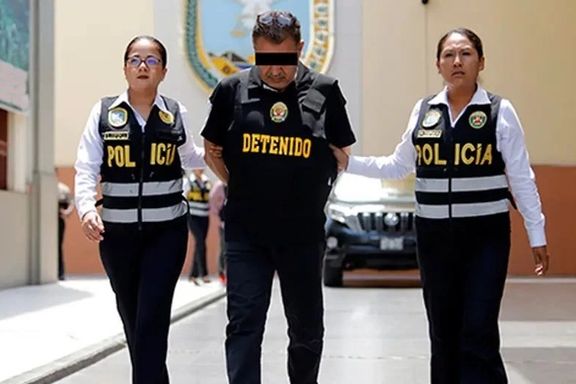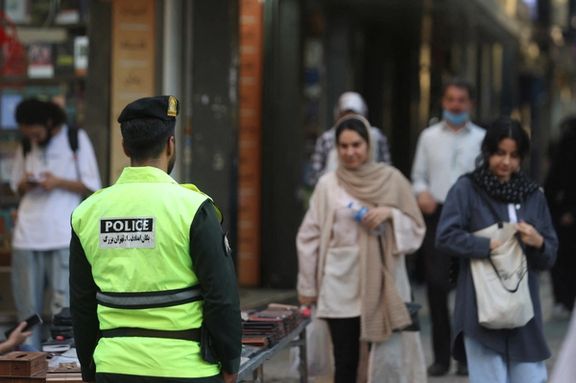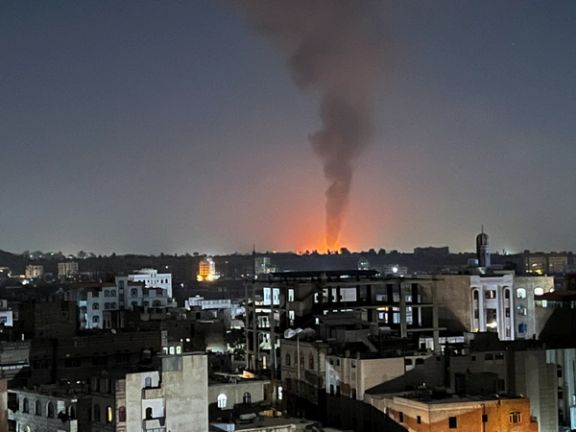IRGC-Affiliated Suspect Sentenced In Peru Over Israeli Assassination Plot

A suspected member of the IRGC has been handed 18-months preventive detention over his attempt to assassinate two Israelis in Peru.

A suspected member of the IRGC has been handed 18-months preventive detention over his attempt to assassinate two Israelis in Peru.
Investigations are still underway regarding the motive of the suspect, identified as Majid Aziz, who acquired Peruvian nationality through marriage. His two accomplices Ángelo Trucios and Walter Loja, both Peruvian nationals, have received the same sentence.
“It has been established with a high degree of plausibility” that the three suspects had conspired to kill Israelis, ruled the Peruvian judge in charge of the case.
According to the prosecutors, Azizi contacted the Peruvians to plan to kill two Israeli citizens living in the city of Cusco, once the capital of the Inca Empire. One of the Israeli targets works as a tour guide and the other owns a café.
Azizi was apprehended in March after he withdrew money from the Interbank bank, located in the Plaza de Armas in the center of the capital Lima. According to reports at the time, he was arrested over plotting to carry out a terrorist attack at the Asia-Pacific Economic Cooperation Forum (APEC).
The conspiracy in Peru is one of several Iran-backed attempted attacks over the last year on Jewish or Israeli targets, either carried out or foiled, in countries including Greece, Azerbaijan and Cyprus.
Over the past two years, many Iranian political activists and opposition figures have urged Western countries to designate the IRGC as a terrorist organization over its role in suppressing dissent in Iran and orchestrating attacks abroad.

One hundred political prisoners and activists lambasted Iran’s latest crackdowns on mandatory hijab, branding it “hostile insistence on homogenizing people’s lifestyles”
Iran’s streets are once again the scene of the government’s 'military campaign against oppressed, enlightened and courageous women of the country', said the signatories of the statement, further adding that the government’s policy of enforcing compulsory hijab with force is simply an instrument to intimidate dissenters.
At a time when a war looks to be brewing and when systemic mismanagement and corruption in government have made life miserable for Iranians, Iran has decided to wage a war at home against people in the streets, the statement claimed, signatories including Nobel Peace Prize laureate Narges Mohammadi.
On April 13, Iran launched its first ever direct offensive against Israeli territory with more than 350 drones and cruise and ballistic missiles, 99% of which were downed by Israel and a US-led coalition, according to the Israeli army. Through its proxies, Iran has also been targeting US facilities in the Middle East and international shipping in a joint effort since October 7 when Iran-backed Hamas in Gaza invaded Israel, triggering the longest Gaza war since the terror group took over the strip.
On the same day as the aerial assault, the Iranian government started to implement its new plan – called Project Nour – to crack down on women who defy compulsory hijab. Activists and observers contend that the coincidence of the two events is no accident and that the regime intends to quell any kind of dissent, including anti-war voices, under the pretext of hijab enforcement.
Former political prisoner Abolfazl Ghadiani (Qadiani) called Ali Khamenei a “power-worshipping tyrant” on the back of the new policies, saying Iran’s Supreme Leader has dispatched his forces to the streets to suppress women as he fears a likely revival of the “Woman, Life, Freedom” movement of 2022. The uprising, sparked by the death in morality police custody of Mahsa Amini, has led to the greatest challenge to the theocratic dictatorship since the founding of the Islamic Republic in 1979.

Calls for action grew louder in Iran on Wednesday, following an announcement that Iranian rapper Toomaj Salehi has been sentenced to death for supporting anti-regime protests in 2022.
Thousands expressed their outrage on social media, proposing a day of action across the world, something that has not happened for a while. There were also reports from Tehran of night-time chants against the regime, as well as youngsters writing slogans on city walls in support of the increasingly popular artist.
Toomaj Salehi broke out of the underground rap scene in Iran with his 2021 single, Rat Hole [surakh mush], in which he attacked those Iranians – inside and outside Iran – who choose to side with the regime or not to use their platforms to augment or relay the voice of struggling and dissenting Iranians. He became a household name and a symbol of heroic resistance after he joined protesters in 2022, despite clear and imminent danger to his life.
He was first arrested in October 2022 at the height of the protests better known as Women Life Freedom movement –that was sparked by the death of a young woman (Mahsa Amini) who was arrested because the police didn’t like her outfit, and was beaten on the head while in custody.
In July 2023, Toomaj was sentenced to 75 months in prison, after Iran’s Supreme Court effectively ruled out a death sentence. He was released on bail in November, more than a year after he was first arrested. A few days after his release, he published a video message, detailing his mistreatment and torture by intelligence agents of the regime. He was rearrested almost immediately.
In January, Isfahan's Revolutionary Court ignored the higher court’s ruling for clemency and brought new charges against him, according to his lawyer, Amir Raeisian. It is for those new charges, chief among them 'baghy' (or armed rebellion), that Toomaj has been sentenced to death.
His sentence has been met with a mix of shock and anger – from Tehran and Isfahan to Berlin and Washington D.C.
“We strongly condemn Toomaj Salehi’s death sentence and the five-year sentence for Kurdish-Iranian rapper Saman Yasin,” US special envoy on Iran Abram Paley posted on X. “We call for their immediate release. These are the latest examples of the regime’s brutal abuse of its own citizens, disregard for human rights, and fear of the democratic change the Iranian people seek.”
Many Iranians view with suspicion the Biden administration and its messages of support, having witnessed its efforts to reach a deal with what they see as a brutal government that has lost legitimacy to rule.
The death sentence handed to Toomaj Salehi comes amid heightened tensions abroad and renewed crackdown on women inside. It could thus be read as yet another attempt by the regime to say it is in charge and as determined as ever to suppress all forms of dissent.
“Since its inception, the Islamic Republic has waged war on artists, particularly those who have used their talents to advocate for Iran’s liberation,” Iran’s exiled prince Reza Pahlavi posted on X. “I call on the international community, particularly Toomaj’s peers in the arts, to be his voice and to demand an immediate revocation of this sham sentence and his unencumbered release from prison.”
Toomaj Salehi and his defense team have 20 days to appeal against the ruling –and they will, according to his lawyer, Amir Raesian.

Two weeks into the latest round of violent crackdowns on Iranian women refusing to wear the hijab, certain so-called reformist and moderate politicians and commentators are cautioning the state about its harsh approach.
At the same time, some female journalists assert that the crackdown is part of the regime's ongoing strategy to stifle dissent, by reinforcing the ideological pillars of the Islamic government.
Mohammad Javad Azari Jahromi, the country’s former Communications Minister, said "although hijab may be a rule Allah wants to be enforced, yet it cannot be over and above the very essence of religion which is based on monotheism."
Writing on his Telegram channel, the former Minister stated that "as the holy prophet and other Muslim saints have stated, the rules of Islam cannot be established by using force against Muslims.”
Jahromi also criticized the government for not taking any lessons from the failure of previous rounds of crackdowns on Iranian women.
Notably, Jahromi – a former intelligence officer – was sanctioned by Western countries, including the US, for being a key player in the Iranian “regime’s censorship and surveillance campaign, which intensified in the wake of anti-regime protests” in 2019.
Jahromi made the statement prior to Mehdi Fazaeli, a member of Supreme Leader Ali Khamenei's Office, informing reporters on Friday that Khamenei had warned certain Iranian officials about their inappropriate approach to hijab enforcement.
This month, multiple reports show that the state’s so-called morality police and other entities have once again escalated the violent enforcement of the mandated Islamic hijab, after Khamenei called for strict measures against women.
Female Iranian journalists, including Roya Karimi Majd, have meanwhile highlighted that the violent treatment of women may have been an attempt to suppress potential dissent in Iran.
Quoting reports that said more Iranians paid attention to the news of the crackdown on women than those who reacted to the news of tensions between Iran and Israel, she wrote on X: "Is the Islamic Republic trying to distract Iranians' attention from the tensions with Israel by the widespread crackdown on women? This is a show of power in the streets to scare all those who might think of an anti-war demonstration! Women are being beaten up so that other protesters take a lesson."
In an article on Iran International’s Persian-language website, gender studies researcher Zahra Bagheri Shad stated, "Ali Khamenei has described defying hijab as a politically haram [prohibited] issue. That is because women who defy the compulsory hijab are the most powerful; social force to defeat regressive elements. Despite repeated harsh crackdowns, Iranian women will not put a step back."
Cleric Mohammad Ali Abtahi who was so-called reformist President Mohammad Khatami's Chief of Staff in the late 1990s and early 2000s warned hardliners "to be mindful of unity in the country rather than suppressing women at a time a war is going on between Iran and Israel”.
"Although revolutionaries across the globe praised Iran for its direct confrontation with Israel, the news of the violent crackdown on women in the streets of Iran only made Israel and other opponents of the Islamic Republic happy," Abtahi said.
He stressed that the crackdown on Iranian women undermined Iranians’ pride world over as a result of the massive drone and missile attacks on Israel.
In 2003, while Abtahi served as Vice President, Iranian-Canadian journalist Zahra Kazemi was raped and tortured by Iranian officials at Tehran’s Evin Prison, ultimately succumbing to her injuries. After days of denial by the government, Abtahi conceded that Kazemi died as a result of being beaten.

An increasing number of Iranian politicians, media outlets, and senior clerics are voicing criticism of the government's handling of the country's worsening economic crisis.
With inflation expected to surpass 50%, the Iranian people are facing increasingly desperate conditions.
Referring to the hardships that many families are grappling with, Ayatollah Abdollah Javadi-Amoli warned that these problems could eventually lead to loss of faith in a meeting with the CEO of Iran’s National Bank (Bank Melli Iran) earlier this week.
Emphasizing the importance of Islam, he stated, “Religion will be wrecked if the economy cannot satisfy [the needs of the] people…After religious matters, money and wealth are what matters the most in the country.”
As a former member of the Expediency Council and a "marja" – a high-ranking religious authority in Shia Islam with many followers – Javadi-Amoli's views are considered significant. Government officials often visit him for both religious and political guidance, reflecting his continued influence.
An official from the Ministry of Roads and Urban Development stated on Saturday that Iranians in the lowest six percentiles cannot afford to buy a house, and that even renting is unaffordable for those in the lowest four percentiles.
“We are facing people who cannot even afford maintenance costs even if we provide their housing,” Naser Rezaei, deputy director of New Towns Development Company of the ministry said.
Iranian media, including some conservative outlets, are increasingly critical of the government's failure to control inflation and prevent the depreciation of the national currency. They also point to ambiguous and often contradictory regulations that enable corruption in the sector.
According to the conservative Khorasan newspaper, for instance, the prices of various legumes, an important item in the Iranian diet, have increased by 30%, red meat by 25%, and rice, also a staple, by 10%.
The newspaper contended that the rise in food prices is not related to increased demand during the month of Ramadan or the conflict with Israel, as officials often claim. Instead, it argued that the increase occurred before these events and is solely the result of government policies.
“The government's economic team is weak, but the weakest of all is the government's economic management,” lawmaker Jalil Rahimi-Jahanabadi, one of the few so-called reformists in the soon-to-be outgoing parliament, told Khabar Online.
Rahimi-Jahanabadi, who is also a member of the parliament's National Security and Foreign Policy Committee, argued that while there may be experienced officials at the first deputy and minister levels, the government lacks an "economic commander." He noted that President Ebrahim Raisi, coming from a judiciary background, has no experience in economic matters.
Recently, discussions have predominantly focused on the ongoing and significant friction between the Minister of Economy, Ehsan Khandouzi, and the Governor of the Central Bank of Iran, Mohammadreza Farzin.
The stark differences in the policies of the two economic bodies, which have recently become more publicly known, have, many say, nearly paralyzed the government's economic apparatus.
Despite the evident issues, the government continues to assert that its economic bodies have made significant progress and denies any problems.
Sepehr Khalaji, head of the government’s information council, stated on Wednesday that there are no plans to make changes to its economic structure.
On Saturday, the reformist Etemad Online published excerpts of an interview with former President Hassan Rouhani’s VP, Es’hagh Jahangiri, in which he criticized both the government and parliament for their economic policies and widespread corruption.
In the interview, conducted over a month ago, Jahangiri expressed his shame over the fact that regional countries, which he said were once less developed than Iran, have now become the benchmark for comparison among Iranians.
“They once compared themselves with Europeans, well, if not Europe but at least Japan and [South] Korea,” he said.

A coalition vessel successfully engaged one anti-ship ballistic missile (ASBM), which was launched from the Iranian-backed Houthi "terrorist-controlled areas" in Yemen over the Gulf of Aden, the US military said in a statement on Thursday.
"The ASBM was likely targeting the MV Yorktown, a US-flagged, owned, and operated vessel with 18 US and four Greek crew members," it said.
"There were no injuries or damage reported by US, coalition, or commercial ships," it added.
Yemeni Houthis armed and supported by the Islamic Republic of Iran have been targeting commercial vessels in the Red Sea area since last November, Iranian Supreme Leader Ali Khamenei called on Muslims earlier that month to blockade Israel in response to its invasion of Gaza.
US Central Command, CENTCOM, also reported drone launches from Yemen either targeting naval vessels or commercial ships in the region.
Earlier, Houthis said they targeted the Maersk Yorktown ship and an American warship destroyer in the Gulf of Aden as well as targeting the Israeli ship MSC Veracruz in the Indian Ocean, the Iran-aligned group's military spokesman Yahya Sarea said in a televised speech on Wednesday.
The United States and the United Kingdom have launched several air strikes against the Houthis in retaliation for their missile and drone strikes targeting vessels.